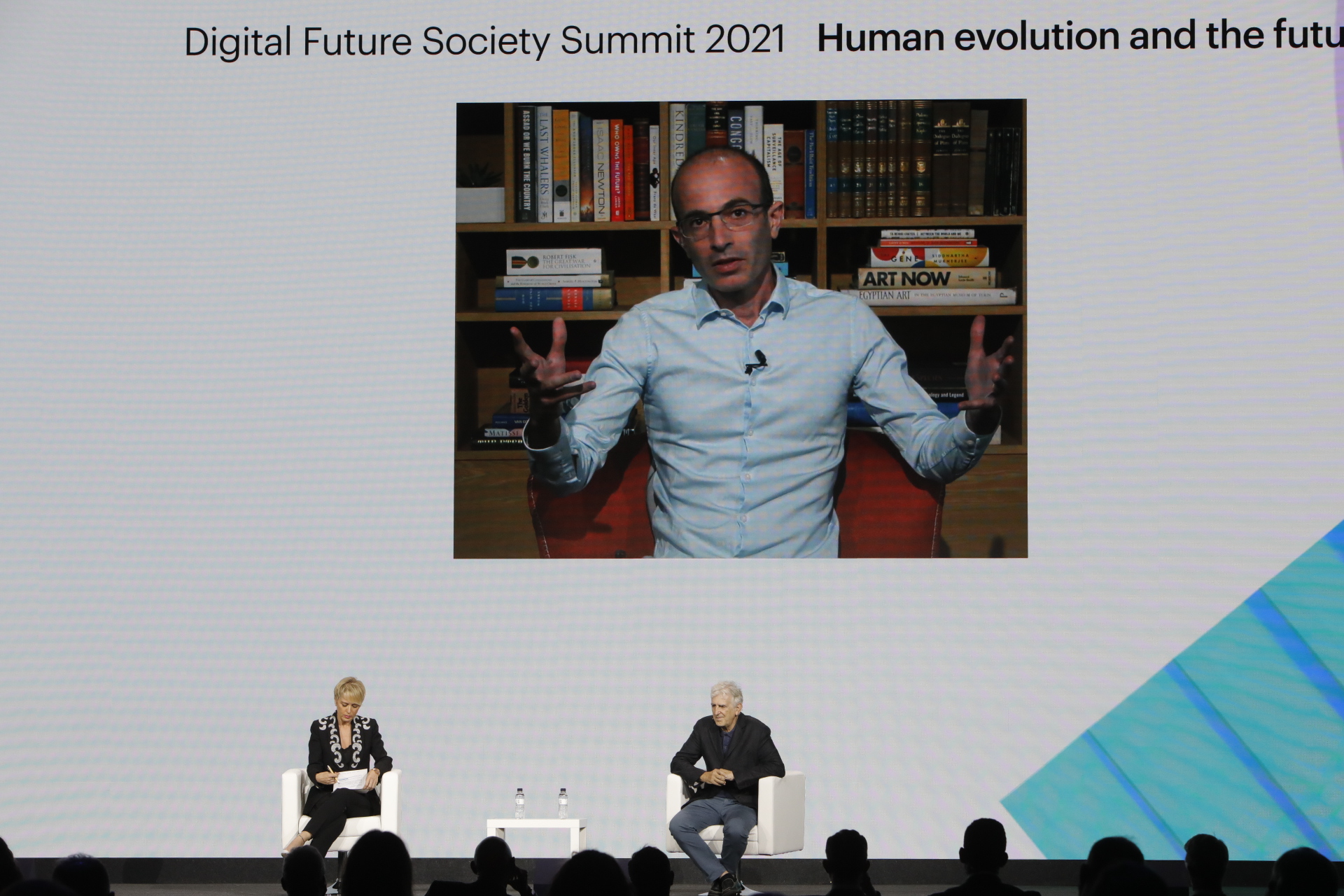
- The event has counted on the presence of His Majesty, King Felipe VI

30 June, 2021
Digital Future Society, promoted by the Second Vice-Presidency -Ministry of Economic Affairs and Digital Transformation- of the Government of Spain and Mobile World Capital Barcelona, has held today at MWC Barcelona 2021 a meeting between top-level speakers on humanism in the digital age. Leading thinkers, institutional leaders, activists and personalities from the private sector have debated the multiple opportunities offered by technology, as well as the disruptions that it entails and that must be addressed, from an ethical and humanistic perspective, to solve the challenges of the digital emergency.
The First Deputy Mayor of the Barcelona City Council, Jaume Collboni, welcomed the event and highlighted tha Barcelona has become the digital capital and one of the technological centers of atteaction in Europe. “We must avoid losing out from this digital revolution, we must continue to promote digital competitiveness without leaving anyone behind.” He also emphasized the creation of the Digital Future Society three years ago as a forum for civic, social and democratic rights in the new technology era.
The Secretary of State for Digitalization and Artificial Intelligence, Carme Artigas, was in charge of moderating the first round table on human evolution and the future of a connected world, who stressed that this type of debate serves to set out big questions “whose solution can be offered by the technology itself”. Artigas has pointed out that “the current crisis we are facing, which has its health, climate and digital aspects, has called into question the future of humanity in the digital age with a series of revolutionary disruptions”.
The historian Yuval Noah Harari has underlined in his speech that Artificial Intelligence and Big Data are already changing the world and that “the great revolution and the greatest danger will be the ability to hack into human beings, get under our skin and know what that we are feeling and thinking, because our feelings are biological patterns and that is exactly what the AI analyzes well”. However, the Israeli writer wanted to provide an optimistic vision, emphasizing that “technology, used intelligently, can create the best health system in the world, but we should not expect technology to give us the solution, it only gives us tools and answers, the solution is in the hands of humans”.
In conversation with Harari, the paleoanthropologist Juan Luis Arsuaga, has referred to how humanity is being affected by the macro trends of the digital age. “We humans create problems and we hope that science will solve them for us, science is now the new God in which we all want to believe. We are like children who wait for science to produce miracles, but it is time to grow up, become adults and face the problems that lie ahead such as the conflict between human civilizations, progress and the environment”, Arsuaga pointed out.
In the second part of the event, the CEO of GSMA, Mats Granryd, also highlighted the importance of ethical debate at the largest mobile communication event in the world. “Mobile technologies have been more important than ever in the last year, the industry has stepped forward to discuss the future in a pioneering way, we were also the first industry to commit to the Sustainable Development Goals”.
A second round table, moderated by Cristina Colom, director of the Digital Future Society, has included representatives from the private sector and the civil society, who have talked about responsible technologies in the digital society. Colom has pointed out that there is an undeniable opportunity to address the technological debate from digital humanism: “Global collaboration is essential to achieve a more fair and equitable digital society, we have to do it all together. The Covid-19 crisis has revealed inequalities and has accentuated digital gaps and the private sector can play a leading role in this fight against the digital emergency”.
The Vice-President of Public Policy for Europe, Middle East and Africa at Facebook, Markus Reinisch, has placed an emphasis on inclusion, not only as a question of supply, but also of demand. “The demand for a digital life during confinement and the Covid pandemic has overwhelmed and, despite that, there are regions and communities that are on the margins of this. Without the inclusion of these groups we cannot build a more fair world”. Reinisch puts faith in working in favor of digital literacy to improve the digital inclusion of people with disabilities and women.
For his part, the Director of Public Policies and Internet at Telefónica, Christoph Steck, also agreed that, during the pandemic, “we have seen inequalities and gaps emerge that have widened, this access to digitization has been very asymmetric”. The representative of Telefónica has emphasized that companies should promote and help from education: “The changes are so fast that we have to join forces, it is necessary to help improve digital skills in different social profiles, both older and younger people, to help them find a job, for example”.
The lawyer and activist specialized in technology and human rights, Renata Ávila, has remarked that it is a priority to rise from the pandemic crisis with a better world, for this “we need not only systems that monitor, but also systems that intervene by improving it.” And she adds: “In 2021 we still talk about connectivity as if it was the main problem, we must be more ambitious and go to the root of the problem, we must address digital gaps and focus on the data that accumulates in very few hands, from this way, we will work for an inclusive digital society”.
For the founder and director of The Ethical Tech Society, Lorena Jaume-Palasí, inclusion “is not creating a space, it implies seeing other perspectives, we have to base ourselves on other ideas, rethink the tools, create a space for other cultures that allow us to recognize and admit that there is more knowledge beyond our civilization”. In this sense, she added that “technology is infrastructure, placing the weakest members in the center is what will make the infrastructures stronger and more inclusive, otherwise it will be a process of recolonization, therefore, it is necessary to include humanism”.
The third part of the event has focused on Europe and how European leadership should be in a global digital landscape. The Vice-President of the European Comission and Comissioner for Competition, Margrethe Vestager, participated in the session, highlighting the importance of this type of technological debates being approached from an ethical and humanistic perspective. “Technologies always have to serve human development, it is essential that all the people of our continent can be part of technology.” The Commissioner stressed that “Europe is a pioneer in establishing a reference framework for all Europeans, with which the rules of a just digital society will be set. Europe has to lead and align itself with other like-minded countries to spearhead an ethical digital space to rebalance core supply chains, intensify cooperation and continue this constructive technology debate.”
The Second Vice-President and Minister of Economic Affairs and Digital Transformation, Nadia Calviño, closed the event by underlining how digitization from a humanist point of view is being led from Europe and, specifically, from Spain. The minister pointed out the need to have an adequate regulatory framework. “Governments must guarantee that digitization goes in the right direction, with adequate regulations to be put into practice, in this sense, stands out the participatory process with a multidisciplinary group for drafting the Charter of Digital Rights”. The Second Vice-President has concluded that it is essential that, from the public sector, the investigation of the digital challenges that affect us as human beings is encouraged: “Europe has chosen to have its own digitization system, therefore, the future is not written, it is up to us how we write it”.
Stay up to date about everything
Subscribe to stay up to date with the latest content from Mobile World Capital Barcelona.